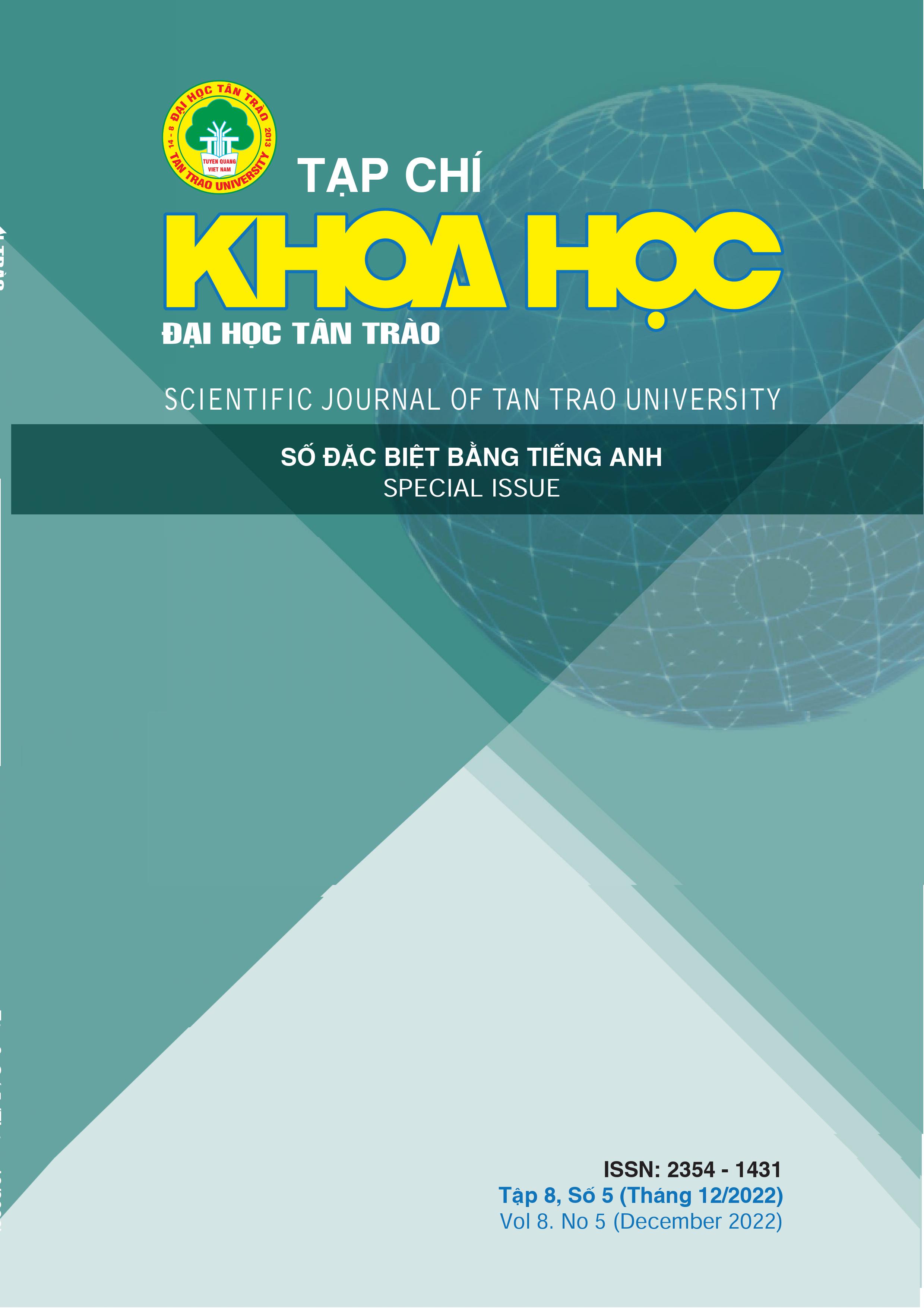THỰC TRẠNG PHẢN ỨNG SAU TIÊM VACCINE PFIZER CỦA CÁN BỘ, GIẢNG VIÊN VÀ NGƯỜI LAO ĐỘNG TRƯỜNG ĐẠI HỌC TÂN TRÀO NĂM 2021
DOI:
https://doi.org/10.51453/2354-1431/2022/869Từ khóa:
Vaccine Pfizer, phản ứng sau tiêm.Tóm tắt
Đại dịch COVID-19 đã cướp đi hàng triệu sinh mạng trên toàn thế giới, số người mắc bệnh và số người chết vẫn tiếp tục gia tăng. Vaccine Pfizer đang được sử dụng rộng rãi cho cả người trưởng thành và trẻ nhỏ tại Việt Nam. Do đó, chúng tôi tiến hành nghiên cứu: “Thực trạng phản ứng sau tiêm vaccine Pfizer của cán bộ, giảng viên và người lao động Trường Đại học Tân Trào năm 2021”. Từ đó, cung cấp thêm bằng chứng về tính an toàn của việc tiêm vaccine COVID-19 cho các nhà sản xuất vaccine cũng như toàn bộ người dân, đề xuất các khuyến nghị trong công tác phòng COVID-19 của nhà Trường. Nghiên cứu hồi cứu, được thực hiện từ tháng 11 năm 2021 đến tháng 1 năm 2022 thông qua phỏng vấn 123 cán bộ, giảng viên và người lao động đã tiêm vaccine Pfizer, chọn mẫu toàn bộ bằng bộ câu hỏi có sẵn. Kết quả: 79,7% có các phản ứng sau tiêm vaccine Pfizer mũi 1. 78,9% có các phản ứng sau tiêm vaccine Pfizer mũi 2. Giới tính có mối liên quan có ý nghĩa thống kê với phản ứng sau tiêm vaccine Pfizer ở cả mũi 1 và mũi 2.
Tải xuống
Tài liệu tham khảo
References:
/[1]. Ministry of Health (2021), Decision No. 3695/QD-BYT on the addition of Article 1 of Decision No. 1654/QD-BYT dated March 23, 2021 of the Minister of Health on conditionally approving vaccines for urgent needs in the prevention and control of the COVID-19 epidemic, August 3, 2021.
/[2]. Ministry of Health (2021), Decision No. 2908/QD-BYT on conditional approval of Comirnaty vaccine for urgent needs in the period of COVID-19 disease prevention and control, June 12, 2021.
/[3]. National Institute of Hygiene and Epidemiology National Immunization Program (2021), Practical Manual on Immunization against COVID-19 (Pfizer-BioNtech's Comirnaty) (Training manual for health workers).
/[4]. How to classify and assess nutritional status based on Z-Score, at website: http://viendinhduong.vn/en/suy-dinh-duong-tre-em/cach-phan-loai-va-danh- gia-tinh-trang-dinh-duong-dua-vao-z-score-603.html, accessed October 24, 2021.
/[5]. Mohamed Adam (2021), Evaluation of Post-Vaccination Symptoms of Two Common COVID-19 Vaccines Used in Abha, Aseer Region, Kingdom of Saudi Arabia. Patient preference and adherence.
/[6]. Rikin Patel (2022). A comprehensive review of SARS-CoV-2 vaccines: Pfizer, Moderna & Johnson & Johnson, National Center for Biotechnology Information, 18(1): 2002083.
/[7]. Alejandro Pascual Iglesias (2021), An Overview of Vaccines against SARS-CoV-2 in the COVID-19 Pandemic Era. US National Library of Medicine National Institutes of Health.
/[8]. Abanoub Riad (2021), Prevalence of COVID-19 Vaccine Side Effects among Healthcare Workers in the Czech Republic. Journal of Clinical medicine.
/[9]. Seongman Bae (2021). Adverse Reactions following the first dose of ChAdOx1 nCoV-19 vaccine and BNT162b2 vaccine for healthcare workers in South Korea, National Center for Biotechnology Information, 36(17): e115.
/[10]. Yun Woo Lee (2021). Adverse Reactions of the second dose of the BNT162b2 mRNA COVID-19 vaccine in healthcare workers in Korea, National Center for Biotechnology Information,36(21): e153.
Tải xuống
Đã Xuất bản
Cách trích dẫn
Số
Chuyên mục
Giấy phép

Tác phẩm này được cấp phép theo Giấy phép Quốc tế Creative Commons Attribution-ShareAlike 4.0 .
Bài báo được xuất bản ở Tạp chí Khoa học Đại học Tân Trào được cấp phép theo giấy phép Ghi công - Chia sẻ tương tự 4.0 Quốc tế (CC BY-SA). Theo đó, các tác giả khác có thể sao chép, chuyển đổi hay phân phối lại các bài báo này với mục đích hợp pháp trên mọi phương tiện, với điều kiện họ trích dẫn tác giả, Tạp chí Khoa học Đại học Tân Trào và đường link đến bản quyền; nêu rõ các thay đổi đã thực hiện và các nghiên cứu đăng lại được tiến hành theo cùng một bản quyền.
Bản quyền bài báo thuộc về các tác giả, không hạn chế số lượng. Tạp chí Khoa học Tân Trào được cấp giấy phép không độc quyền để xuất bản bài báo với tư cách nhà xuất bản nguồn, kèm theo quyền thương mại để in các bài báo cung cấp cho các thư viện và cá nhân.
Mặc dù các điều khoản của giấy phép CC BY-SA không dành cho các tác giả (với tư cách là người giữ bản quyền của bài báo, họ không bị hạn chế về quyền hạn), khi gửi bài tới Tạp chí Khoa học Đại học Tân Trào, tác giả cần đáp ứng quyền của độc giả, và cần cấp quyền cho bên thứ 3 sử dụng bài báo của họ trong phạm vi của giấy phép.






